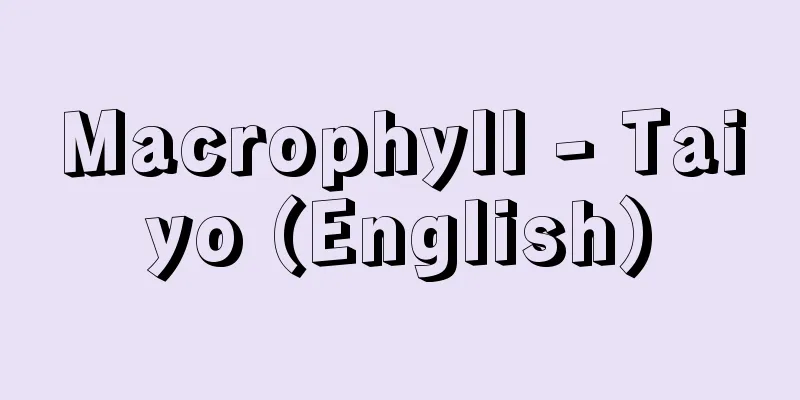God of Fire - Hinokami

|
A god who controls and manages fire. In Japan, fire is considered to be easily polluted, so when sacred fire is needed for festivals and other occasions, a new fire is lit. However, fire itself is not worshiped, but the god who controls it is worshiped instead. Well-known deities as fire gods are enshrined in various places as Kanjo-kami (divine offerings) at Akiba Shrine in Shizuoka Prefecture and Atago Shrine in Kyoto Prefecture. Also, as a god of fire prevention, talismans are often placed in household altars or back doors. Apart from these deities, worship of the fire god in hearths and hearths is seen throughout the country. In many areas, the god of fire is called Koujin or Sanbo Koujin, and there are also widespread examples of offering three handfuls of rice seedlings to Koujin or Okamasama during rice planting, referred to as "three handfuls of seedlings." In general, in eastern Japan, Koujin as the god of fire and Okamasama as the god of the fields are enshrined together, while in western Japan, there is a tendency to enshrine a hearth god who is a syncretism of both the god of fire and the god of the fields. Because fire is said to be easily polluted, there are many taboos due to the fear of the curse of the Aragami (wild god), and even today in the Kyushu region there is a custom known as Aragami-harai, where blind monks visit each household to purify the hearth and Aragami (wild god). Just as there are lands where the word kamado means main family or branch family, fire and the fire god are considered symbols of the household, and there is a custom of protecting the fire in the hearth in the hope of its continuation. Belief in the fire god is particularly prominent from the Satsunan Islands to Okinawa, where not only are there fire gods in each household, but there are also fire gods worshipped by entire villages, with around three natural stones as their sacred object. [Masaru Sasaki] [Reference] |Source: Shogakukan Encyclopedia Nipponica About Encyclopedia Nipponica Information | Legend |
|
火を統御し、管理する神。わが国では火は穢(けが)れやすいものと考えられ、祭礼など神聖な火を必要とするときには、改めて新しい火をおこした。しかし、火そのものを崇拝することはなく、火をつかさどる神をその対象とした。火の神としてよく知られている神格は、静岡県の秋葉(あきば)神社と京都府の愛宕(あたご)神社で、勧請(かんじょう)神として各地に祀(まつ)られている。また、火伏(ひぶせ)の神として、御札(おふだ)が民家の神棚や勝手口などに納められていることも多い。こうした神格とは別に、かまどやいろりを対象にした火の神の信仰は、全国的にみられる。火の神を荒神(こうじん)ないしは三宝(さんぼう)荒神とよぶ地域は広く、三把苗(さんばなえ)などと称して田植のときに荒神やオカマサマに三把の苗を供える例も広範囲に分布する。一般的に東日本では火の神としての荒神と田の神としてのオカマサマが併祀(へいし)され、西日本では火の神と田の神の両者が習合したかまどの神を祀るという傾向がある。 穢れやすいとされる火ゆえに、荒神の祟(たた)りを恐れる禁忌も多く、九州地方では現在でも荒神祓(ばら)いといって、盲僧が各戸の竈(かまど)荒神を清めて回る風習がある。なお、カマドという語が本家・分家を意味する土地もあるように、火や火の神がイエの象徴とされて、その永続を願って炉の火を守り続ける風もみられる。火の神の信仰は薩南(さつなん)諸島から沖縄にかけてとくに顕著であり、家々の火の神にとどまらず、3個ほどの自然石を神体とした集落全体で祀る火の神がある。 [佐々木勝] [参照項目] |出典 小学館 日本大百科全書(ニッポニカ)日本大百科全書(ニッポニカ)について 情報 | 凡例 |
Recommend
Ili [river] - Ili
A river that flows through both China and Kazakhst...
Gosho doll - Goshoningyo
This is an artistic doll that was created in Kyot...
Amber weaving
A type of silk fabric with vertical ridges. Thin,...
Nueva Caceres (English spelling)
...Population: 103,000 (1994). Founded in 1573, i...
Ise Town
[1] The former name of the area around Honmachi, N...
Prunus cerasus (English spelling) Prunuscerasus
… [Isao Shimura]. … *Some of the terminology that...
Large sticker - Oobari
...In the 1970s, environmental destruction became...
Atelopus
...However, the family also includes the non-pois...
Tetraclita squamosa formosana (English spelling) Tetraclitasquamosaformosana
…[Shigeo Gamou]. … *Some of the terminology that ...
Book of Hours - Jitosho (English)
A personal prayer book written for Christian laity...
Pressure Shield - Akkishield
...A cylindrical machine called a shield (origina...
Virgin Birth - Shojokotan (English spelling) Virgin Birth
The phrase in the Apostles' Creed confession o...
Kurukshetra (English spelling)
A Hindu pilgrimage site in the eastern part of Har...
Ceratolobus
…About 500 species of rattan are found in tropica...
Late fees - late fees
A public law levy imposed when local taxes and var...









